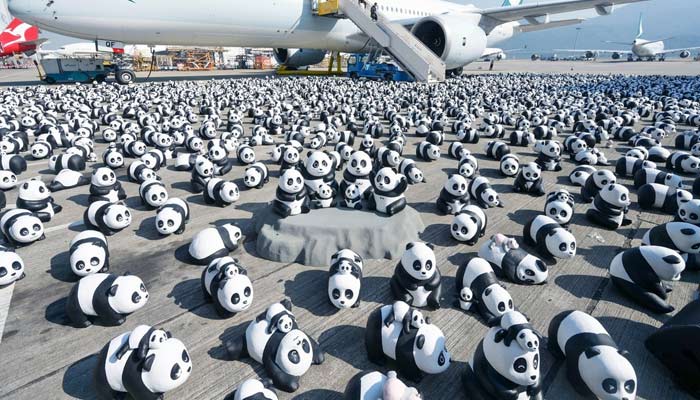If you are travelling to Hong Kong this weekend, then you are in for a special treat as thousands of giant panda sculptures will welcome you and locals there starting from this Saturday.
This massive exhibit, titled ‘Panda Go! Fest HK’, was launched during a ceremony at Hong Kong International Airport earlier this week, featuring 2,500 panda sculptures.
The exhibit reflects the city’s growing enthusiasm for the beloved bears following the recent birth of two cubs at a local theme park
According to CNN, the panda sculptures will first be on display at the Avenue of Stars in Tsim Sha Tsui, a bustling shopping district, before moving to three other locations throughout the month.
One key site is Ocean Park, home to the twin cubs, their parents, and two additional pandas gifted by Beijing this year.

Notably, six of the sculptures were designed using recycled materials and are inspired by these iconic bears.
The twin cubs, born to Ying Ying — recognised as the world’s oldest first-time panda mother — may b4egin interacting with visitors as early as February.
Additionally, the displays are also part of Hong Kong’s efforts to leverage its use of pandas to enhance its economy and restore its status as a top tourism destination in Asia.
Local tourism representatives are optimistic about the potential of housing six pandas, hoping to boost visitor numbers even though caring for pandas in captivity is expensive.
Officials have also encouraged businesses to capitalise on the popularity of the bears to seize opportunities in what some lawmakers have dubbed the “panda economy.”
Most of these special sculptures will be auctioned online for charity and the proceeds will be donated to Ocean Park to support giant panda conversation efforts.
Ying Ying and the twin cubs’ father, Le Le, are the second pair of pandas gifted by Beijing to Hong Kong since the former British colony returned to China’s rule in 1997.
The first pair were An An and Jia Jia who arrived in 1999. Jia Jia, who died at 38 in 2016, is the world’s oldest-ever panda to have lived in captivity.








